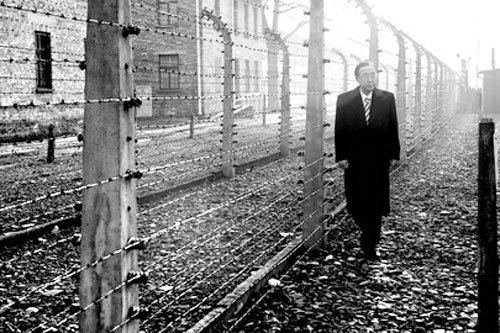.jpg)
(combined services)
Poland—United Nations Secretary-General Ban Ki-moon and Mrs. Ban visited Auschwitz-Birkenau, the former Nazi concentration and death camp and the Auschwitz Jewish Center last week. The Secretary-General was joined by two Holocaust survivors: Rabbi Yisrael Meir Lau, Chief Rabbi of Tel Aviv and Chairman of the Yad Vashem Council, father of the current Ashkenazi Chief Rabbi of Israel, and who once held that office himself; and Marian Turski, historian, journalist, Vice President of the International Auschwitz Committee, and Chairman of the Council of the Museum of the History of Polish Jews. First they visited Auschwitz I: The Arbeit Macht Frei Gate, Blocks 4 and 5 (extermination and physical evidence of the crime), the Execution Wall at Block 11, the Jewish Pavilion at Block 27, the crematorium and gas chamber.
They then continued through Auschwitz II-Birkenau: The Gate of Death, the selection ramp, BII sector, the women’s camp, the ruins of crematorium and gas chamber II, the International Monument, and remarks were made in the “Sauna” registration building.
“I am truly overwhelmed and humbled. No words can adequately express my feelings. How can a state and individuals be so cruel and use systematic brutality against humanity?” Ban said, “Yet nothing can truly prepare one for this epicenter of evil, where systematic murder unique in human history reached its atrocious climax,”
Ban continued, “I stare at the piles of glasses, hair, shoes, prayer shawls and dolls, and try to imagine the individual Jews and others to whom they belonged. I stand in disbelief before the gas chambers and crematorium — and shudder at the cruelty of those who designed this death factory.”
Ban said, “The world must never forget, deny or downplay the Holocaust. We must remain ever on our guard.” Ban added, “We will stand in eternal solidarity with the survivors and safeguard their testimony so their legacy will never die.”
Ban had already visited Yad Vashem and the Holocaust Museum in DC on more than one occasion, yet he said, “Decades later, it remains almost impossible to come to terms with the nature and scale of this genocidal crime. …
“Millions of others – including Poles, Sinti, Roma, Soviet prisoners of war, the disabled and mentally ill, dissidents and homosexuals—were exterminated in similarly barbarous circumstances,” said Ban. “In the years since, the flames of hatred and persecution have risen again to consume other societies—from the killing fields of Cambodia to the forests of Srebrenica and to the hills of Rwanda. Even today, the fire smolders. Antisemitism retains its hold in too many places. In Europe and elsewhere, migrants, Muslims, Roma and other minorities face rising discrimination—and find too few defenders. We will continue to shine a light on these unspeakable crimes so that they [may] never be repeated.”
Said Ban, “[But] Auschwitz-Birkenau is not simply a register of atrocities. It is also a repository of courage and hope. Today I say loud and clear: never again.”








